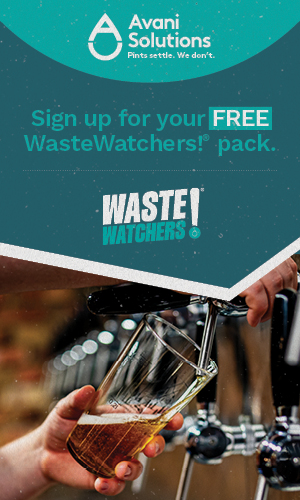Recent tragedies have led to a rise in brands displaying blanket allergen warnings. But does their caution risk driving customers away? Nick Hughes reports.
Kingsway, Central London is as close to a perfect location as it gets for a food-to-go brand. Situated a stone’s throw from the West End, the road and its surrounding streets are littered with workplaces and academic institutions providing a reliable supply of hungry office workers and students.
Within a 500 yard stretch between High Holborn and Aldwych household names such as Pret, Eat, Leon, Itsu, Pod and Wasabi battle to attract every potential customer into their shop – well, almost every customer.
If you’re a food allergic consumer you could be forgiven for thinking these brands no longer welcome your trade. On display in every one of these outlets are fridge stickers or notices displaying warnings to the effect that no guarantee can be given that any food product is entirely free of allergens.
This type of legal disclaimer is legitimate and has been in use for several years; yet there is a sense among experts and allergy sufferers that brands are using them with increasing ubiquity to cover their backs in light of recent high profile allergen incidents, including the tragic death of Natasha Ednan-Laperouse, the teenager who died of an allergic reaction on a flight after eating a Pret baguette.
“They have been used in a more targeted way in the past, perhaps mentioning a few specific allergens, but now they are suggesting potential contamination from the full list of 14 allergens, when nothing has apparently changed. It’s causing ructions as allergic people are saying: ‘well, what are you doing differently from last week?’ says Hazel Gowland from Allergy Action, which provides expert advice and training in food allergen risk management.
Gowland adds that the sector has been particularly shaken by the case of Megan Lee, the schoolgirl who died from an asthma attack after her warnings about allergies posted on a Just Eat order for the Royal Spice takeaway in Oswaldtwistle, Lancashire, were ignored. Gowland says the fact the two takeaway bosses were prosecuted under health and safety legislation is of huge significance because unlike food offences, such as mislabelling, that time out after a year, leaving little time for thorough investigation and an inquest, there is no time limit on bringing a prosecution under health and safety law.
Leon is one brand that has found itself a target for allergy campaigners. Last autumn, the restaurant introduced a sign behind its counters that reads: “We handle all allergens in our kitchen and cannot guarantee our dishes are allergen-free.” Then in January this year the high-profile blogger and journalist Alexa Baracaia, whose son is allergic to egg, peanuts, nuts, sesame and lentils, posted on Twitter that she had been told by staff at the brand’s restaurant on London’s Strand not to eat there if her son’s allergies were life threatening. “We’ve previously had great service – now you decide you can’t cater???” Baracaia wrote.
Following Baracaia’s tweet, Leon founder John Vincent published a letter on its website where he stated: “The idea that Leon could cause harm to one of our guests is horrifying. And we would therefore ask those of you with serious allergies, to consider carefully whether you choose to dine with us.”
It’s hard not to feel a large dose of sympathy for food-to-go brands who feel it necessary to issue blanket warnings over the possibility of unintentional cross-contamination despite taking multiple measures to minimise the risk. The unique production model of food prepacked for direct sale means businesses benefit from neither the process-driven uniformity of factory-line production nor the flexibility to cook to order of a restaurant environment.
Products and ingredients are delivered to outlets in different states of preparedness and then, to varying degrees, cooked, assembled and packaged in back-of-house kitchens. As such, Leon’s head of marketing Rebecca Di Mambro explains that it is impossible to guarantee dishes will be allergen-free when ingredients are present in the same kitchen, despite strict kitchen processes that segregate ingredients. “Let’s take Leon porridge as an example,” says Di Mambro. “We serve porridges with a choice of milk: organic dairy milk and organic cashew milk. Both are potentially fatal allergens. The porridges are slow cooked and stored in separate bain-maries and we use different coloured ladles for serving it into pots. The pots are passed from the kitchen to the counter through different shelves on our hot pass.”
In a similar vein, Itsu’s group brand and marketing director Jemima Ferguson notes the business increasingly operates like a restaurant, making dishes on demand, often one by one, to suit customer preferences. “When communicating vital information on potentially dangerous allergens, this fact must be considered,” she adds.
FSA guidance says that precautionary allergen statements should only be used when there is a genuine, assessed, unavoidable risk that good manufacturing practice cannot avoid. Pod’s head of brand Rosie Glencross believes, in this context, signs saying that Pod can’t guarantee that either hot or cold food is allergen-free are justified. “At Pod we have busy and sometimes very small kitchens where the teams are producing between 70 and 90 different recipes every day, with hundreds of different ingredients,” she says. “We have implemented numerous rigorous and stringent processes to avoid any cross contamination between products; however the nature of freshly prepared food in these environments means that it is our responsibility to advise customers of the risks and provide them with the quickest access to the information they need, should they have an allergy or dietary requirement.”
Although clearly well intentioned, one consequence of blanket warnings is they may give customers at risk from allergens the impression that they would be better off eating elsewhere. Baracaia told i News: “I think a lot of businesses are running scared and they’re taking the wrong path – one that’s shrinking options for allergy sufferers instead of improving them.”
Glencross says it is absolutely not Pod’s intention to suggest that allergy sufferers are not welcome as Pod customers. “On the contrary, we have been very conscious in our communication that we want customers to understand that we pride ourselves on offering a diverse menu, suitable for many different dietary requirements. However, in light of the recent events that have rocked our industry, it is our ultimate priority to put our customers’ safety first.”
The FSA says the use of precautionary statements or disclaimers provides a warning to the most sensitive food allergic consumers. Dr Chun-Han Chan, team leader for the agency’s food allergy policy, says she can’t comment on the practices used by individual food chains who display such statements; she does however note that all food businesses must have an appropriate food safety management system in place to manage risk and provide safe food, and adds that the FSA is working with the catering industry to provide businesses with clear guidance on allergen management.
There’s little doubt the out of home sector is committed to finding a solution to the allergen challenge – not least because businesses face missing out on the custom of the estimated two million people in the UK who have a food allergy. Pret has convened a group of key brands to find the best solutions and recommendations for how the industry can operate in the safest way possible. It has also committed to implementing full ingredient labelling across all of its UK stores this summer. Eat, meanwhile, says it already labels over 80% of its products with full ingredient information listed and allergens clearly highlighted.
This puts both brands ahead of the policy curve following the launch in January of a government consultation on amending allergen information for food prepacked for direct sale. The consultation, which covers only the provision of allergen information for intentional ingredients and not precautionary statements due to cross-contamination, sets out four policy options. They range from the promotion of best practice within the current framework (option 1) and the provision of “ask the staff” labels on packaging of food prepacked for direct sale (option 2), to full allergen labelling on pack (option 3) and full ingredient labelling (option 4).
Both Pod and Itsu favour option two with Glencross pointing out that options 3 and 4 introduce the new risk of mislabelling, which could lead to an increase of incidents in a business such as Pod’s.
This risk, which is also highlighted in the consultation document, is rejected by the parents of Natasha Ednan-Laperouse who, writing in The Grocer recently, stated: “While human error will always exist, it cannot be an excuse to do nothing when the lack of clear labelling is far more dangerous.”
Gowland says whatever conclusion is reached a new policy must be practical, effective and enforceable. On the wider question of blanket precautionary labelling her advice to businesses is to divide their advice to customers into three categories: “what we do for everybody, what we can also do for you if you ask, and what we can’t promise”. She adds that “the tone you use and the style of your messaging needs to be carefully thought out; at the moment it’s pretty defensive”.
Brands that have been forced on the defensive by tragic incidents now have a choice to make. Work with those living with allergies to find a practical solution, or accept that, in the future, two million potential customers passing their stores may simply walk on by.








